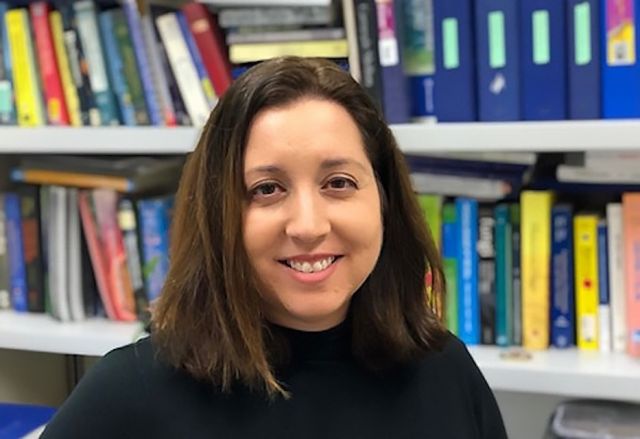Michelle O’Malley Receives the Prestigious Colburn Award for Excellence in Publications

ICB Systems and Synthetic Biology co-leader and project leader of four ICB projects, UCSB Chemical Engineering Professor Michelle O’Malley has received the American Institute of Chemical Engineers (AIChE) 2021 Allan P. Colburn Award for Excellence in Publications by a Young Member of the Institute.
The award recognizes significant contributions to chemical engineering through publications by younger members of the institute and is the most prestigious award for early-career chemical engineers given by the AIChE.
"I'm honored to be recognized with the Allan P. Colburn Award from AIChE,” said O’Malley. “This honor inspires me to reflect on all of the wonderful publications that originated from my laboratory—many of which came from very risky research projects that took many years to bring to fruition. I attribute the Colburn Award to the hard work and dedication of current and past trainees in my laboratory, as well as several key collaborators who conducted the research and worked with me to publish these studies."
O’Malley is perhaps best known for having established a new research field by engineering anaerobes, which evolved to decompose and recycle carbon biomass throughout the Earth—from our guts to landfills and compost piles. She is the world leader in engineering anaerobic fungi and associated microbiomes and has published more than 30 papers supported by the ICB on various aspects of the subject in leading journals, including Science, Nature Microbiology, Nature Genetics, and Nature Chemistry.
O’Malley’s group has not only provided breakthrough insights into enzymes that already outperform the current industrial standards, but they have also multiplied the amount of sequencing data available for anaerobic fungi, developed the first standard laboratory practices to work with these fragile organisms and made discoveries about biomass-degrading enzymes that had eluded the community for several decades. Her innovative approach and results are generating substantial attention not only from the scientific community, funding agencies and industry, but also from the popular press, including features in BBC News, Newsweek, CNBC News, and Forbes.
ICB project leader and Chemical Engineering department Chair Rachel Segalman congratulated O’Malley, “The Colburn Award is the most prestigious award for early-career chemical engineers given by our national disciplinary society, AIChE, and is a reflection of Michelle’s innovation and insightful contributions to the field. We’re thrilled for her and to have her as part of our community.”
Consistently recognized for her work, O'Malley has received a U.S. Department of Energy Early Career Award in 2013, a TechConnect Innovation Award in 2014, a National Science Foundation Early Career Award in 2015, a Presidential Early Career Award for Scientists and Engineers (PECASE) from President Obama in 2016—the highest distinction bestowed on young scientists by the federal government, a Camille Dreyfus Teacher-Scholar Award and a Rising Star Award from the American Chemical Society’s Women Chemist Committee in 2017. O’Malley has also been named one of the Top 35 Innovators Under 35 by the MIT Technology Review and was included in the 2019 Science News list of Ten Scientists to Watch. In 2020 alone, O’Malley received an AIChE Food, Pharmaceutical and Bioengineering Division Early Career Award, an American Society of Microbiology Award for Early Career Applied and Biotech Research and was named a Fellow of the American Institute of Medical and Biological Engineering.
O'Malley's ongoing work focuses on the fact that biomass digestion is generally performed by consortia of microbes and she is now developing systems-level tools to evaluate and direct microbial interactions. She and her students have recently pioneered new approaches to isolate not only fungi, but also their dependent bacteria and methanogens, to create a simplified system to model their interactions. Her group’s research set the foundation for engineering microbial interactions in anaerobes to accelerate biomass breakdown and serves as a unique spring board to study and engineer how microbes “partner” in nature and in bioreactors. Her long-term vision is to achieve a fundamental understanding of the genetic pathways that will lead us to understand and control biomass breakdown in anaerobic microbiomes, which has applications in carbon cycling, bioremediation and production of high value chemicals.
View O’Malley’s most recent ICB funded publication related to this article.
